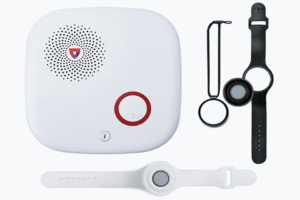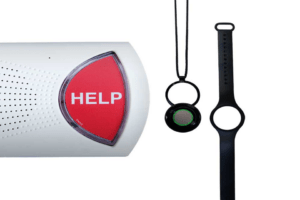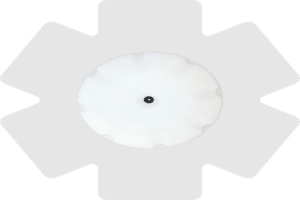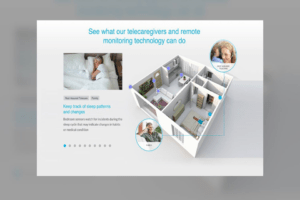
Top 6 Monitoring Systems for Elderly People

When choosing a system for monitoring an elderly parent remotely, consider their unique needs and their budget. Monitoring systems for seniors collect a range of data like movement, temperature, and behavioral patterns. They also identify symptoms like high blood pressure and certain heart conditions, ensuring seniors’ lives are safer. Though monitoring systems can help seniors age at home and provide family members peace of mind, they can’t replace the need for in-person supervision or hands-on care.
Let our care assessment guide you
Our free tool provides options, advice, and next steps based on your unique situation.
Key Takeaways
- The best elderly monitoring systems provide diverse features and accessory options, allowing families to easily track a senior’s comfort, wellness, and safety.
- Consider your loved one’s budget and needs since elderly monitoring devices differ in their capabilities, monthly fees, service charges, and additional costs.
- Senior care options may be worth exploring if your loved one requires care, like assistance with daily activities, struggles to manage chores, falls frequently, or wanders.
1. Medical Guardian

Medical Guardian is a flexible medical alert system offering customizable features so you can tailor it to meet your loved one’s specific needs. Their at-home alert system offers the option of connecting through a landline with MGClassic or a cellular connection using MGHome Cellular. The MGClassic is an especially good choice for those living in areas without broadband or with poor cell service.
These systems include the following:
- Easy installation
- Help button range of up to 1,400 feet
- Substantial battery life, along with a backup battery life of 32 hours
- 24/7 monitoring center staffed by trained emergency professionals
The MGClassic is the cheaper option, due to the free equipment and its monthly subscription cost of $32.95 a month. MGHome Cellular, however, includes a $149.95 equipment cost and a monthly subscription fee starting at $37.95. Both subscription costs become cheaper if you pay quarterly or annually, rather than monthly.
Medical Guardian also offers an assortment of similarly priced mobile medical alert devices. These include the Mobile 2.0 with a help button and advanced location detection, the Mini Guardian wearable monitoring device, and the MGMOVE smartwatch and medical alert system.
You can purchase additional accessories and features for extra assurance, though they will add a little more to your monthly bill. These include things like a fall detection pendant, wireless wall button, Elite 911 (a one-button speaker that allows you to speak to a 911 operator), and more.
Family and caregivers can monitor their loved one’s wellness and behavior remotely through the free MyGuardian caregiver app.
A Place for Mom may be compensated if you choose to use Medical Guardian’s services. Per our editorial guidelines, we clearly disclose financial relationships around featured products or services.
2. Aloe Care Health

Though it offers many of the same monitoring features as Medical Guardian, Aloe Care emphasizes consistent updates for family members and two-way communication. It’s a senior monitoring system boasting a multitude of features and three pricing options designed to help caregivers stay updated on their loved one’s wellness without being too invasive. Its features include the following:
- In-home, voice-activated “Smart Hub” console, which supports two-way calls with family, friends, and calls for help
- 24/7 emergency response team
- Emergency help button
- Motion sensor
- Location tracker
- Temperature and air quality monitor
- Wearable help button included
- Collaborative family care app included
There are currently three systems people can purchase from Aloe Care. The Essentials system includes everything mentioned above, with a one-time hardware cost of $199.99, as well as $39.99 a month for continued service.
The second package is the Mobile Companion 2, an on-the-go device with fall detection and location detection outside the home. These features are in addition to the emergency response monitoring and app access the Essentials system provides. The device has a one-time cost of $149.99 and a monthly subscription plan of $44.99.
The last service is Essentials Plus, which has a one-time hardware cost of $349.99 and a monthly expense of $59.99. It includes everything in the Essentials package, but with some extra perks:
- Coverage at home and on-the-go
- Mobile Companion 2 (4G LTE)
- Automatic fall detection (not guaranteed to detect all falls)
Read more:10 Signs Your Elderly Parent Needs Help

Let our care assessment guide you
Our free tool provides options, advice, and next steps based on your unique situation.
3. Bay Alarm Medical’s SOS Home

Bay Alarm Medical’s SOS Home Landline system is the most affordable option on this list and is great for active seniors who may not be as independent as they once were. It uses a landline connection and includes a 30-day risk-free trial period. Caregivers can also connect their loved one’s monitoring system to the Bay Alarm Medical App for remote location tracking and account management.
Their standard medical alert system, SOS Home Landline, features the following:
- A main in-home base console
- 32-hour battery backup
- Two-way speaker
- Wearable help button that, when pressed, initiates two-way communication with Bay Alarm Medical’s 24/7 call center
- “Vial of Life” medical information sheet so emergency services can help in a crisis
SOS Home Cellular includes the same features, but with 4G LTE systems that connect up to 60% faster than the landline devices. Bay Alarm Medical also offers mobile alert options, including SOS Mobile, SOS All-in-One, and SOS Smartwatch. These products help preserve active seniors’ family members peace of mind since help is a mere click away in the event of emergencies.
Each of Bay Alarm Medical’s services have a basic cost but can include more features — such as fall detection or a lockbox add-on — by paying a little extra every month. The SOS Home Landline system is the most basic, starting at $19.95 a month and doesn’t require an upfront fee. Similarly, the SOS Home Cellular doesn’t have an equipment cost, but its service is $29.95 a month.
The multitude of products, features, and price variance give a lot of flexibility when deciding which option is best for your loved one.
4. Aeyesafe Monitoring Alert System

Aeyesafe’s senior monitoring system is one of the more advanced options on the market, thanks to the artificial-intelligence sensors it uses to monitor wellness and safety. It features a sound and thermal monitoring system that provides current and historical data using an at-home battery and power supply.
It can also report emergencies or unusual behaviors directly to the caregiver, which make it an excellent system for those aging at home. However, this system doesn’t feature a 24/7 call center like many other services do, meaning a caregiver or loved one will need to respond to alerts.
It’s voice-activated, so a senior can easily request help without having to press a button or wear a device. This device’s heat and sound monitors allow it to provide the following information:
- Body temperature analysis
- Sleep analysis
- Danger detection
- Abnormal behavior detection
- Real-time alerts when there is a cause for concern
Pricing and warranty specifics are available after filling out an online form for more information.
5. Rest Assured

A standout feature of the Rest Assured system is it offers the unique service of remote caregivers who can provide periodic wellness checks, making it an alternative to in-home care. Similar to in-home care, this remote caregiving assistance includes services like medication management. Its range of in-home senior monitoring products and services enable a senior to custom-build a system for their unique needs and home. Family members can access live videos, or monitor alerts through a protected online portal, allowing effortless check-ins.
Rest Assured’s observational features vary based on system components and selected services. They include the capacity to detect the following:
- Motion and falls
- Fires
- Severe storms
- Opening of doors and windows
- Smoke or carbon monoxide
- Glass breaking
- Temperature
- Bed or chair occupancy
Basic installation costs $350 and the service itself is $125 per month, though families can opt for extra features — such as periodic wellness checks or round-the-clock monitoring — that will increase your monthly payments. Contacting Rest Assured directly will allow them to provide a customized plan and price quote.
Many states fund their services through Medicaid waiver programs and other sources, so it’s worth contacting your state’s Medicaid program to see if it’s covered.

Talk with a Senior Living Advisor
Our advisors help 300,000 families each year find the right senior care for their loved ones.
6. Lorex Elderly Monitoring Solutions

Lorex differs from other systems in that it solely provides Wi-Fi security cameras to monitor elderly parents remotely, which is a solid choice for more independent, active seniors. Their systems give caregivers complete control in looking after loved ones through a suite of cameras and smart home accessories.
The basic camera package includes a microphone and speaker, allowing you to check in and communicate with your loved ones using your smartphone. It’s compatible with smart homes, offers hands-free controls, and offers round-the-clock monitoring.
Additional features include the following:
- Custom motion notifications
- Full HD recording with digital zoom
- Night vision
- No monthly fees
- Live video playback
It’s best to install cameras like these in strategic areas, preferably somewhere well-hidden so they don’t feel too intrusive to your loved one. This could include stairways, the kitchen, desks or shelves in living spaces, and near front and back doors.
Due to the wide array of equipment and services, pricing varies considerably. Indoor cameras can be as cheap as $39.99, while outdoor ones can be as high as $199.99.
How to choose a system for monitoring elderly parents remotely
When choosing an alert system to monitor a senior living alone, consider their needs and their budget. You’ll want to note the systems’ different functions, too, as those will clarify their versatility.
To find the best fit, keep the following questions in mind:
- Are there one-time fees, subscription fees, or other contractual obligations?
- Does it have fall detection?
- Does it include home security monitoring for fire, carbon monoxide, and smoke?
- Is it easy to install, set up, and use?
- What is the connectivity, mobility, and range of the product/service?
- Can family members connect to the device?
- Is my loved one willing to wear a help button or sensor?
When should I consider senior living instead of a monitoring system?
Elderly monitoring systems provide a multitude of benefits, but they’re best for seniors who are still fairly independent. If your loved one wants to age in place but needs regular help with dressing, bathing, and other activities of daily living (ADLs), they could benefit from home-based care.
Assisted living is another care option that can provide social opportunities, activities, amenities, and the extra hands-on support they need. Additionally, if you notice signs of dementia like behavioral changes or wandering, memory care could be a better fit.
Senior care communities may be your best option if you don’t believe your loved one will reliably remember to wear their button/sensor or how to operate it in emergency situations. After all, sensors and alarms are only helpful if they are used correctly.
A Place for Mom’s Senior Living Advisors can help you gather information about senior care options and discuss the best fit for you and your loved one, all at no cost to your family.
Families also ask
Is it okay to place cameras in a house to monitor my parent's care?
Yes, but there are many things to consider, such as the number of cameras, their placement, and receiving consent from all involved parties. Be sure to review local laws for recording audio and video since they differ by state, as well as employment contracts for any in-home caregivers.
Is there a way to monitor my mom’s stove when she’s home alone?
Yes, cameras can be used to monitor a senior’s stove, and smart smoke and fire detectors can send alerts in the case of an emergency. Disabling their stove or installing an automatic shut-off device doesn’t provide monitoring but can offer peace of mind and help prevent kitchen fires.
Senior living options in all states
The information contained on this page is for informational purposes only and is not intended to constitute medical, legal or financial advice or create a professional relationship between A Place for Mom and the reader. Always seek the advice of your health care provider, attorney or financial advisor with respect to any particular matter, and do not act or refrain from acting on the basis of anything you have read on this site. Links to third-party websites are only for the convenience of the reader; A Place for Mom does not endorse the contents of the third-party sites.
Make the best senior care decision
Make the best senior care decision